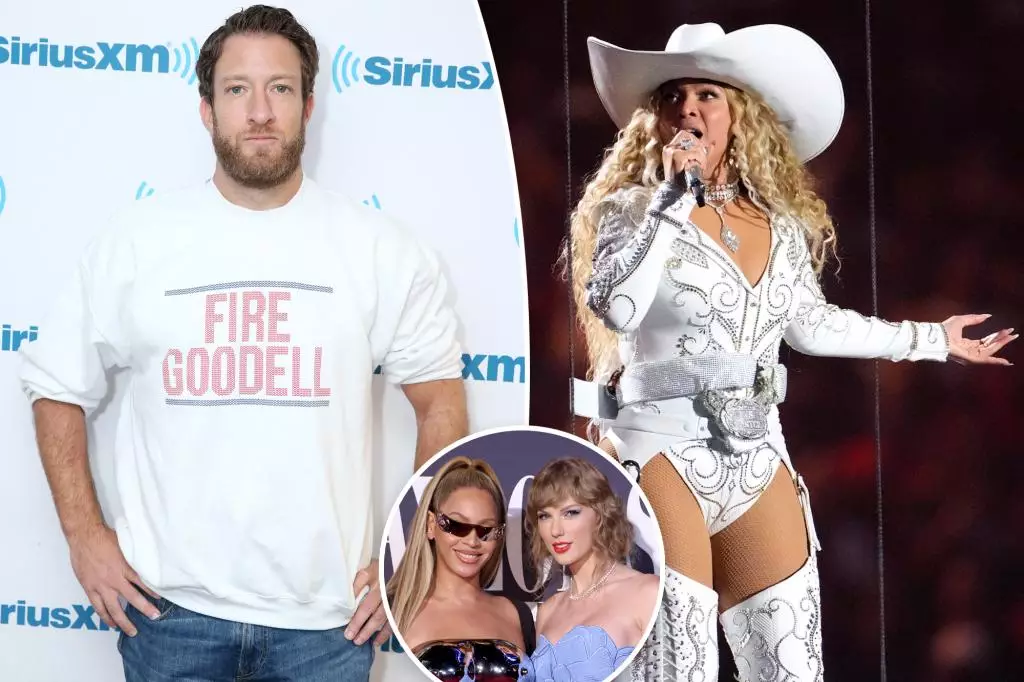In the ever-competitive realm of pop music, fan loyalties can often lead to heated public disputes, as evidenced by Barstool Sports founder Dave Portnoy’s recent comments on social media regarding Beyoncé. Known for his outspoken nature, Portnoy did not hold back when he voiced his dissatisfaction with Beyoncé’s halftime performance at the Christmas Day NFL game between the Baltimore Ravens and Houston Texans. His harsh critique, stating that “Beyoncé has been LOST since Destiny’s Child,” reflects a broader cultural phenomenon in which fans often pit artists against one another. In this case, Portnoy’s preference for Taylor Swift seems to amplify his disdain for the legendary performer, leading us to unpack this ongoing rivalry and its implications within the music industry.
Beyoncé’s halftime show was a meticulously choreographed showcase that featured some of her most popular tracks, including songs from her recent country album, “Cowboy Carter.” The performance was marked by a dramatic entrance on horseback and a vibrant costume adorned with crystals. Accompanied by various talented artists, her 13-minute act was a display of showmanship and vocal prowess. Despite the extensive preparations and the star-studded guest appearances, including the presence of her daughter, Blue Ivy, Portnoy’s review of the performance was anything but kind. His immediate dismissal of her talent raises the question: What constitutes a “successful” performance in the eyes of the fans?
Portnoy’s social media post serves not only as a critique of Beyoncé but also presents a striking comparison to his past remarks about other pop icons. His preference for Rihanna, showcased during her Super Bowl halftime performance last year, indicates a pattern in his commentary where he seems to assert his own musical tastes above the consensus. This illustrates the complexities of public opinion in the music industry, wherein one fan’s voice carries considerable weight but may inadvertently marginalize the contributions of the artists involved. The contention propounded by Portnoy serves as a reminder of how subjective and polarized music critique can be, especially when one artist’s stature eclipses another’s in the public eye.
Portnoy’s criticism emerges amidst a long-standing narrative of rivalry between Taylor Swift and Beyoncé. The music industry has often drawn comparisons between the two, with major outlets like Billboard ranking them in a tight contest for the title of the greatest pop star of the 21st century. While Swift reportedly supports Beyoncé and values her contributions to the music landscape, the fervor and divisiveness perpetuated by fans and commentators like Portnoy continue to stir controversy. It is here we find the crux of the matter: celebrity culture can often become toxic, with fan bases drawing lines in the sand, creating a battleground for public opinion that eclipses the artistry itself.
This dramatic back-and-forth highlights not only personal preferences but also how societal standards influence the music we consume. The scrutiny directed at public figures often leads to a phenomenon termed “cancel culture,” where an artist’s past or present actions may have a long-lasting impact on their reputation. In Portnoy’s case, his entrenched loyalty to Taylor Swift prompts a dismissive critique of Beyoncé, reducing a cultural icon to mere disappointment. The overarching narrative emphasizes the need for a nuanced understanding of the music industry. By elevating one artist over another, we risk losing the essence of the diverse musical landscape that exists.
Ultimately, the discourse surrounding Portnoy’s comments amplifies the existing tensions within pop culture. Whether one leans more towards Taylor Swift or Beyoncé, debates like this fill the airwaves with chatter that distracts from the artistry. Music should unite rather than divide; however, as seen with Portnoy’s commentary, the fervency of fans often leads to exclusionary attitudes. In an era where celebration of talent should reign supreme, let us strive to appreciate the contributions of all artists, learning to enjoy the music for its value rather than a competitive measure.

